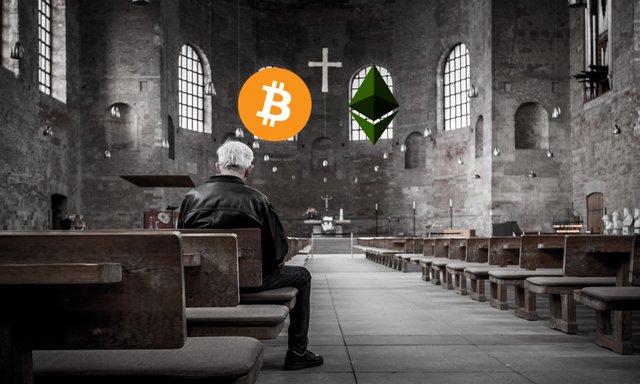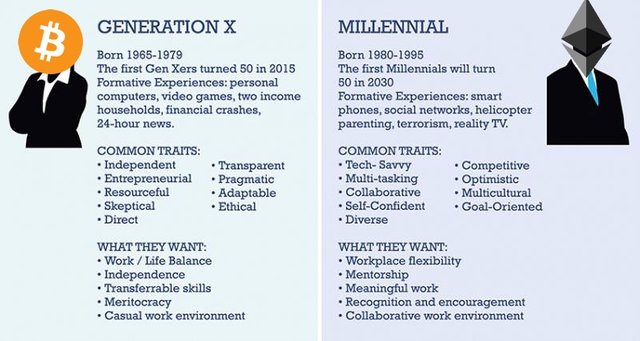Bitcoin vs Ethereum: The ideological divide

When Ethereum co-founder Vitalik Buterin tweeted a proposal for a small fee tax that would finance wallet developers, the reactions were mixed in both the Bitcoin and Ethereum communities. Outside the world of crypto, this sounds fairly reasonable: creating a system to incentivize coders to keep up their good work by virtue of negligible fees is no reason to grab torches and forks to start a riot. 1 gwei/gas is a really small amount that, according to Buterin's calculations, would grant the developers of the wallet clients about 2 million USD per year.
The idea didn't seem to be popular among the Ethereum community members, but it didn't generate much heat either. To some, it's just a wild thought that one of the central figures has released for testing reasons. To others, it's evident that these central figures of Ethereum will have it their way if they want, so they choose to entrust their monetary holdings in the hands of the supposedly more knowledgeable elites.
If an influential bitcoiner went on to make such a proposal, they would fall out of grace in a heartbeat. Imposing taxation is anathema to the core beliefs of Bitcoin, and ideologically defeats the purpose of sovereignty for which most enthusiasts have chosen to support Satoshi's project. This isn't just a matter of protocol or monetary maximalism, but a clear division between the arbitrarily imposed ways of governments, and the voluntaryist tendencies of the new decentralized world.
This example of trying to impose taxation is only a small example which points out to a greater phenomenon: there is both a sociological and a political difference between supporters of Bitcoin and Ethereum. It goes deeper than liking Turing-completeness, believing in tokenization, and views on immutability. In our situation, we have two distinct groups who don't really have much in common but share ideals that are integrated into the same movement.
And with the ugly risk of creating generalizations and stereotypes, let us proceed with the analysis.

Case study one: Vitalik Buterin vs Jameson Lopp
In a sense, this comparison is unfair: Vitalik Buterin was one of the founders of the Ethereum protocol, and has remained a prominent figure which benefits from a somewhat unquestionable degree of authority and respect; on the other hand, Jameson Lopp has only joined Bitcoin about 3 years after it got created and probably can't make a proposal for BTC development without being scrutinized. However, they are both articulate and intelligent individuals who possess both the technical savviness to code and the linguistic skills to write long blog posts. Furthermore, it can be said that they are both parts of the same generation, with Mr. Lopp being about 10 years older.
This is where the similarities between them end and we get into the territory that divides them. First of all, Vitalik Buterin is definitely more open to left-wing ideas and sometimes differentiates between the failure of authoritarian regimes and doctrinary socialism. Conversely, Jameson Lopp never shies away from expressing his libertarian views and goes as far as promoting gun training as a way to protect one's sovereignty. From the very beginning, we see the kind of ideological divide which further justifies their decisions and motivations.
Neither of them is completely representative of the community he comes from, but they are both esteemed thought leaders whose influence can change opinions and shape mindsets. It's very likely that both of them would vehemently deny this leadership component and point out to decentralization of ideas and individual agency, but their personal views on fame and power don't change the fundamental fact that people listen to their opinions.
Yet Vitalik speaks to a crowd that is more likely to embrace socialist ideas and accept concepts such as governance, regulation, taxation, and compliance, while Lopp is the epitome of anarcho-capitalism and sovereignty (at least in his public appearances, that is). It's no wonder that the Ethereum co-founder is able to blend into the Silicon Valley crowds and impress VCs, while the Bitcoin advocate is more akin to cypherpunks who preceded him (Tim May, Wei Dai, Hal Finney, Nick Szabo, and Satoshi Nakamoto).
Case study two: a conflict between generational ideologies
This last argument presented leads to a more complex discussion about the political affinities of every generation. Technically speaking, Vitalik is a mid-millennial born in the early 1990s, while Mr. Lopp is somewhere in between Generation X and the early millennials. The classification is relevant in terms of defining time periods in which they received their first years of education and the world events surrounding them.
If Jameson Lopp graduated from the University of North Carolina in 2007 (when he was presumably 21 years old), then he must have lived his first years of life during the late Reagan era, when the Cold War was coming to an end. This kind of background can shape one's worldview and nurture a general feeling of distrust in relation to the government: if the political climate is more tense and uncertain, then it's more likely for the men who grow in this kind of environment to become self-reliant and autonomous.
Now, the case is not necessarily evident in the case of the two main ideologues of Ethereum, Vitalik Buterin and Vlad Zamfir: while they both have origins in countries that used to be governed by USSR-influenced communist regimes, they don't seem to share the same amount of enthusiasm for anarchy and radical rejection of the political status. It might be due to the governance model of Ethereum and the expectations implied in being involved in a project that must please an interesting combination of venture capitalists and idealistic angel investors, but the advocates of the Turing-complete blockchain seem to be more concerned about compliance and negotiation with governments (as opposed to building an entire economy that denies and defies their authority).
The examples may have gone a little too far, and have most likely taken liberties that are based on opinions that have been expressed at one point in time in a given context. However, they are important to introduce the following theory: Bitcoiners are more akin to the political ideas of baby boomers and Gen-X folks, while Ethereum fans are closer to the stereotypical media depiction of the millennial generation.
One camp is highly skeptical of the government's legitimacy and appreciates freedom more than excessive regulation, while the other is inclined to join the crowd that cheered for Jeremy Corbyn during his stage appearance at 2017's Glastonbury festival.
The former understands the necessity of sound money as a hedge against an increasingly intrusive government, while the latter has most likely grown in peaceful times, in a democratic regime which guarantees the protection of fundamental human rights, and in a context that doesn't justify for the replacement of fiat money (unless Austrian economics or more radical ideas get applied to the financial crisis of 2009).
This point has been purposely avoided until now, but it has to be mentioned for the sake of providing more context: it's very likely that this evident cleavage is rooted in the post-DAO attack hard fork and the transition to Proof of Stake. Both concepts revolve around the idea of establishing institutions of power (the first proves that code is no longer law if financial pressures emerge, and the second contributes to the creation of an oligarchy – the type of regime where the rich only get richer).

Case study three: the economics of Bitcoin and Ethereum
Bitcoiners long for a golden era of sound money when "hold" was the most valuable store of value and means of exchange, while Ethereum fans embrace the complexities of Keynesian economics and global politics. Correspondingly, the protocols follow the underlying ideologies (though it might also be the other way around): Satoshi's invention has a fixed supply, a predictable monetary policy, and a system of incentives that is more or less easy to understand; on the other hand, Ethereum has an unlimited supply, a roadmap that can be delayed according to the will of a few elites, and a governance model which addresses the needs of the status quo.
Under these circumstances, it's no surprise that the most influential person in the ETH space makes a proposal to introduce transaction taxes for the sake of financing wallet developers. While it sounds reasonable, it's a precedent that will lead to many other similar decisions to be made just because the trust system facilitates them. As a project which embraces governance and compliance with laws, Ethereum is bound to make many compromises with the forces that be – just like governments and corporations.
For now, Bitcoin has been resilient in maintaining its principle. Initiatives of hard forking to increase the block size have been labelled as contentious and against decentralization, and the scaling debate has led to the accelerated development of a second-layer infrastructure to take some of the clutter. Similarly, Ethereum also develops scaling solutions like Plasma, Raiden, but takes it a notch farther with the plans to shard the blockchain for greater data efficiency.
It would be unfair to go to far with this comparison, as a project which intends to become a world computer, a reliable platform for smart contracts, and a backbone for tokenization clearly can't follow the same path as something simpler which only aims to be sound money. Both Bitcoin and Ethereum have a long way to go before reaching their goals, but these differences in approach to monetary policy and upgrades reveal a lot about their underlying motivations and ideologies.
Nevertheless, the last point will refer to Ethereum's 12 million founder reward and 60 million ICO pre-mine. Of the 105.171.622 ether units minted at press time, 72 million (about 68%) have been issued before everyone else got their chance to start mining. To the business-minded developers who don't want to worry about losing their status due to potential financial problems, this sounds like a good plan. But hardcore bitcoiners would have never accepted such a premise and look for protocols that are fair to the extent of immaculate conception. This idea leads us to the final part of the article, where we address cleavages and why they're dangerous.
Case study four: dividing the space according to ideological predispositions
In a sense, the phenomenon of attracting like-minded individuals who share similar social and political values is a no-brainer. Friendships and meaningful social relationships are often established on the basis of likeness. However, taking these interactions to the extent that they turn into tribalism is dangerous for progress: while competition is great and brings the best out of each camp, ostracizing and setting boundaries is unhealthy.
When someone new discovers cryptocurrencies right now, they will most likely get drawn to the project which best reflects their worldview. Sometimes it's a friend who helps discern between the sides by introducing a personal passion or involvement in one of the protocols, but individual exploration is just as significant since a Rothbardian will definitely reject anything that deals with taxation and pre-mines.
There isn't enough cooperation to find a middle ground and present the projects as complementary in achieving parallel goals for a better world, so the interactions are often times tense and divisive. The example of Andreas Antonopoulos comes to mind: due to his geekiness and technical background, he pursued Bitcoin and has spent many years exploring its intricacies and educating others. But when he got interested in Ethereum as an acquired taste and started working on educational resources for this other protocol, he has fallen out of grace in the eyes of some puritans. Mr. Antonopoulos, despite still supporting Bitcoin, is getting cast out for not being coin monogamous.
Now let's think about this scenario where a known Ethereum developer who works on blockchain sharding suddenly starts contributing to Bitcoin Core, or vice versa. There would be a lot of tension in the air, fuelled by suspicions of sabotage and bad intentions all around.
Sadly, the relations between Bitcoin and Ethereum supporters reflect the contemporary political landscape from the United States of America, where liberals and conservatives can't even discuss basic issues without resorting to labelling and name-calling. Even if there is a common ground and the incentives are aligned to facilitate cooperation, it's unlikely to happen due to mindsets and narratives that were designed to create division and dissent.
That's not to say that Bitcoin and Ethereum are similar enough to enable multiple collaborations between devs and advocates. But to put it in laymen terms that have been purposely avoided as much as possible throughout the article, bitcoiners resemble supporters of right-wing politics (US and UK conservatives, European liberals, et al) while Ethereum fans are more to the left side of the spectrum (American democrats, UK labour supporters, European socialists).
Essentially, there's nothing wrong with having to ideologically-different camps that stand for opposite values. However, this new decentralized world should take some cues from the disastrous international politics and try to be better. If we're building the foundations of a system where you're a maximalist of either A or B, then we still have lots of lessons to learn. Competition is great, conflicts of ideas are constructive, helpful and healthy in a society, but at the end of the day we must live with each other and distinguish between rivalry and common goals that even the biggest of anarchists can accept.
Generation X/Millennial picture credit: AESC
Also read:
- Ethereum vs NEO: Which blockchain will provide better long-term value?
- Full Moon ahead for ether
- Top 5 cryptocurrencies to watch in 2019
Originally posted on Crypto Insider : https://cryptoinsider.com/bitcoin-ethereum-ideological-divide/
This was a very interesting post. I've never heard of Ethereum until now.